Google's introduction of Google.cn, a censored search engine for Chinese users, caused an uproar in the U.S. Just how different are the results for controversial keywords using Google.cn?
The search results below are current as of April 10, 2006 and have been tested from locations in China and the United States. Due to the continuously changing nature of both search engine indexes and authorities' oversight, the results you see may be different from those displayed here. Also, Google.cn is not the only Chinese search engine to censor certain results -- Baidu (the most popular search engine), Yahoo! and others alter search results to remove blacklisted terms. And it's also important to acknowledge that most users are unlikely to be searching for broad terms like "democracy" -- we are covering these search terms just to quickly capture the effect filtering has on search results in China.
Image Search: Tiananmen Square (in English)
It's worth noting that Internet users in China probably aren't searching for Tiananmen Square in English (how often do Americans search for "Times Square" in Chinese?); only expatriates and journalists are likely to perform this search. But as it's an obvious search question, we've included the results here.
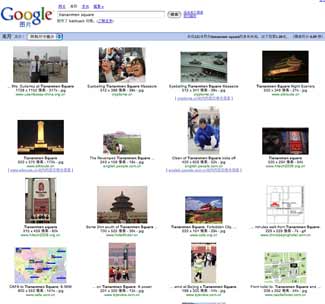
Google.cn displays tourist-related aspects of Tiananmen Square -- scenery, local hotels, etc. But the second and third results show photos of the 1989 protests hosted on cryptome.cn, a U.S.-based site banned in China. Users attempting to click through to these images will not get anything further. Nonetheless, we can see from this that Google.cn's filtering isn't fool-proof.
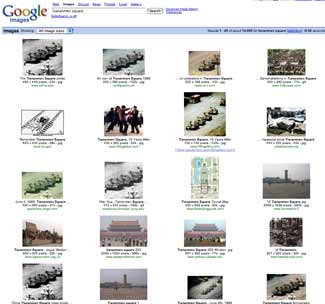
Google.com in the U.S. displays images of the "Tank Man" and the 1989 Tiananmen protests.
Image Search: Tiananmen Square (in Simplified Chinese)
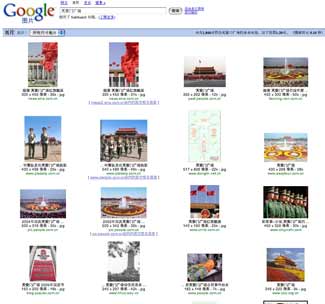
Google.cn shows in many photos of Tiananmen Square -- flowers in bloom, soldiers marching, recent special events, etc.
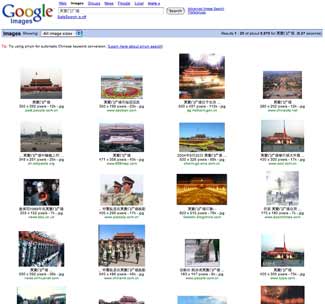
Google.com reveals many photos of Tiananmen Square, and several photos of soldiers. The first photo related to 1989, in the third row of results, is of former Secretary-General of the Chinese Communist Party Zhao Ziyang visiting the protesting students in Tiananmen Square. The fourth photo on that row is from the Epoch Times -- a publication often accused by the Chinese authorities of being associated with the banned Falun Gong movement.
Search: Democracy (in Simplified Chinese)
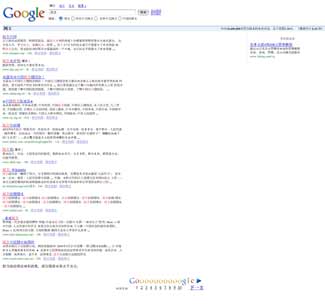
Google.cn shows many links to sites that are unavailable in China: http://www.chinamz.org/ (China Magazine, a controversial publication), http://www.dpp.org.tw/ (the official site of Taiwan's pro-independence Democratic People's Party) and http://www.dphk.org/ (the Hong Kong Democratic Party). About 18.6 million pages indexed for this term, another example of Google.cn's less-than-perfect filtering of blacklisted content.
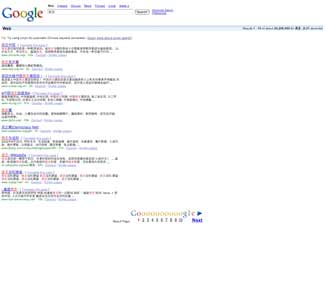
The first page of Google.com's results are quite similar to Google.cn's, but the search returns 34.2 million pages -- nearly twice as many as Google.cn.
Search: Falun Dafa (in Simplified Chinese)
Falun Dafa (also known as Falun Gong) is a spiritual movement that was declared illegal by the Chinese government in 1999.
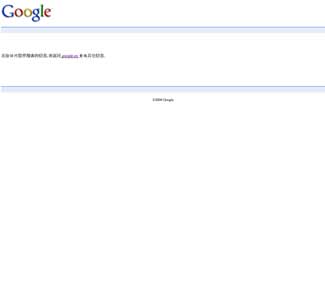
Google.cn yields zero results.
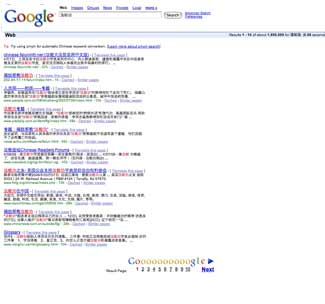
Google.com yields 1.95 million results. Most of the first-page results are Falun Dafa-run sites in the U.S. and Taiwan -- none of which would be viewable in China.
Search: Tiananmen (in Simplified Chinese)
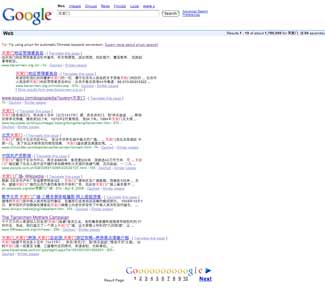
Google.cn yields about 956,000 results -- primarily travel and history links. There is a link to a Chinese-language Wikipedia entry on Tiananmen 1989, which is unavailable in China.
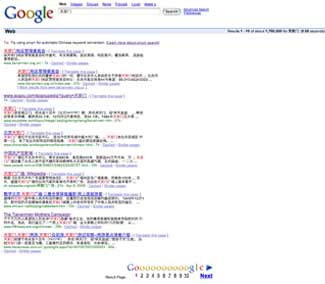
Google.com returns many pages, including the site of the Tiananmen Mothers who are petitioning for an accounting of the Tiananmen Square massacre. 1.7 million pages are indexed with this term.
- Related Links
- Solving a Real-Life Problem With Search Engines
Researcher Roland Soong navigates a maze of search engines to show how one could find content banned by the authorities -- in this case an essay entitled "Modernization and History Textbooks" by Yuan Weishi that resulted in a temporary shutdown of the publication that employed him. - Keywords Used to Filter Web Content
The Washington Post reveals a list of restricted keywords used by a Chinese blog host. Many of these terms are likely to be forbiddden on many different types of Internet services in China, including search engines.